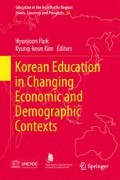Abstract
This study presents the key competency index for Korean youth, which falls into the two broad categories of key competencies under the DeSeCo Project in the OECD: using tools interactively and interacting in heterogeneous groups. The method suggested by Bonnet et al. (Int Labour Rev 142(2), 213–238, 2003) is utilized here for the compilation of these indices based upon the results of PISA and ICCS 2009. The results indicate that Korean youth retain a much higher position in using tools interactively, but a much lower position in interacting in heterogeneous groups. These findings suggest that Korea’s youth and education polices are mainly centered on the development of the intellectual capability of youth. Specific challenges and directions are highlighted with regard to the future development of key competencies in Korea.
Access this chapter
Tax calculation will be finalised at checkout
Purchases are for personal use only
Notes
- 1.
A draft paper was published as a report to the National Youth Policy Institute in Korea, Youth key competency development and promotion plan III (Kim et al. 2010). This work was supported by the National Research Foundation of Korea Grant funded by the Korean Government (NRF-2012S1A3A2033331).
- 2.
Top-performing among the 75 countries or economies participating in PISA include Shanghai-China (556), Finland (536), Hong Kong-China (533), Singapore (526), Canada (524), New Zealand (521), Japan (520), and Australia (515). In this case, Korea holds the second position in the PISA 2009 reading assessment (OECD 2010b).
- 3.
Korea holds the second position after Shanghai-China (600) among the 75 countries or economies participating in the PISA 2009 mathematics assessment.
- 4.
Countries performing better than Korea among the 75 countries or economies participating in the PISA 2009 science assessment are Shanghai-China (575), Finland (554), Hong Kong-China (549), Singapore (542), and Japan (539).
References
Bonnet, F., Figueiredo, J. B., & Standing, G. (2003). A family of decent work indexes. International Labour Review, 142(2), 213–238.
Chang, G. Y., & Kim, K. (2009). The lifetime of Korean youth and their lifestyle. Journal of Future Oriented Youth Society, 6(4), 139–155 [In Korean].
Eurydice European Unit. (2002). Key competencies: A developing concept in general compulsory education. Brussels: Eurydice European Unit.
Hipkins, R., Boyd, S., & Joyce, C. (2007). Documenting learning of key competencies: A discussion paper. Wellington: Ministry of Education.
International Association for the Evaluation of Educational Achievement. (2010). International civic and citizenship education study 2009. Amsterdam: IEA. http://www.iea.nl/iccs_2009.html. Accessed 17 May 2013.
Kim, K., Kim, J. Y., Chang, G. Y., Joe, K. S., & Park, H. J. (2010). Youth key competency development and promotion plan III. Seoul: National Youth Policy Institute [In Korean].
Ministry of Education, Science and Technology. (2009). The school curriculum of the Republic of Korea. Seoul: Ministry of Education, Science and Technology. http://cutis.mest.go.kr. Accessed 17 May 2013.
Organization for Economic Cooperation and Development. (2005). The definition and selection of key competencies: Executive summary. Paris: OECD. http://www.oecd.org/edu. Accessed 17 May 2013.
Organization for Economic Cooperation and Development. (2006). Society at a glance: OECD social indicators. Paris: OECD.
Organization for Economic Cooperation and Development. (2010a). The PISA international database. Paris: OECD. http://pisa2009.acer.edu.au. Accessed 17 May 2013.
Organization for Economic Cooperation and Development. (2010b). PISA 2009 results: Executive summary. Paris: OECD. http://www.pisa.oecd.org. Accessed 17 May 2013.
Rychen, D. S., & Salganik, L. H. (2003). Key competencies for a successful life and a well-functioning society. Cambridge, MA: Hogrefe & Huber.
Schulz, W., Ainley, J., Fraillon, J., Kerr, D., & Losito, B. (2010). ICCS 2009 international report: Civic knowledge, attitudes, and engagement among lower-secondary school students in 38 countries. Amsterdam: International Association for the Evaluation of Educational Achievement (IEA).
Voorhees, A. A. (2001). Competency-based learning models: A necessary future. New Directions for Institutional Research, 110, 5–13.
Author information
Authors and Affiliations
Corresponding author
Editor information
Editors and Affiliations
Rights and permissions
Copyright information
© 2014 Springer Science+Business Media Dordrecht
About this chapter
Cite this chapter
Kim, K. (2014). Youth Key Competencies in Korea. In: Park, H., Kim, Kk. (eds) Korean Education in Changing Economic and Demographic Contexts. Education in the Asia-Pacific Region: Issues, Concerns and Prospects, vol 23. Springer, Singapore. https://doi.org/10.1007/978-981-4451-27-7_7
Download citation
DOI: https://doi.org/10.1007/978-981-4451-27-7_7
Published:
Publisher Name: Springer, Singapore
Print ISBN: 978-981-4451-26-0
Online ISBN: 978-981-4451-27-7
eBook Packages: Humanities, Social Sciences and LawEducation (R0)

